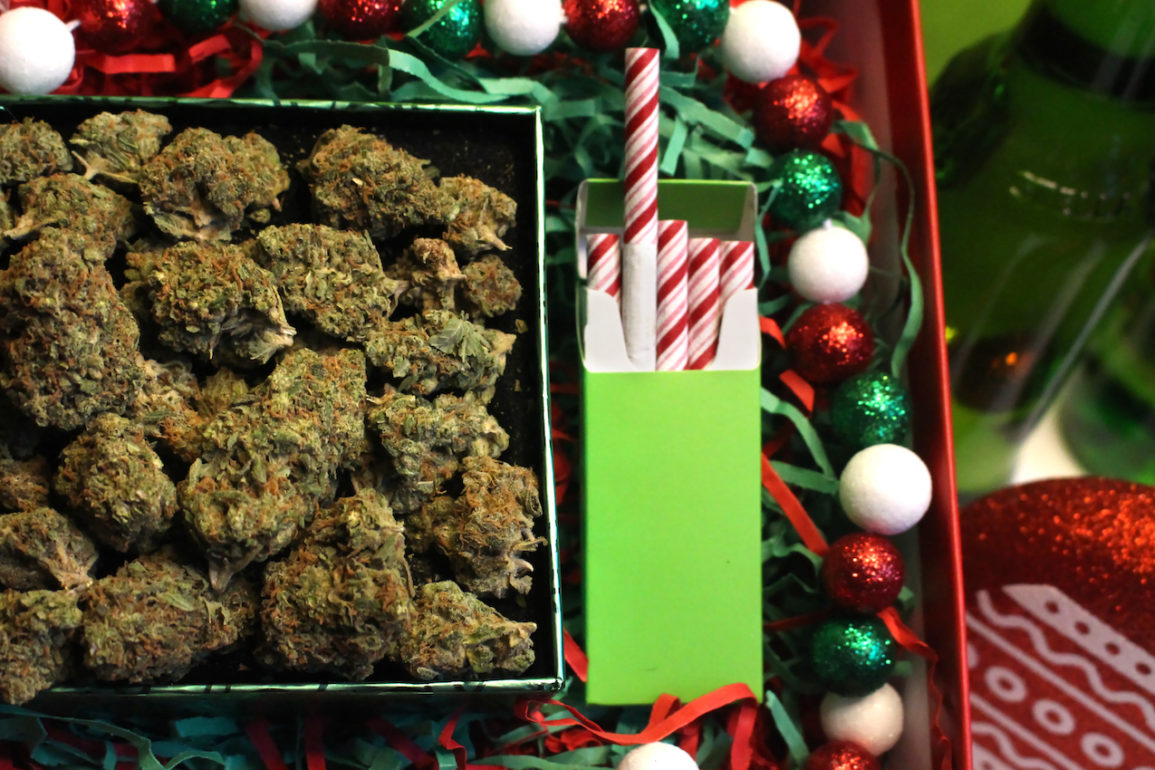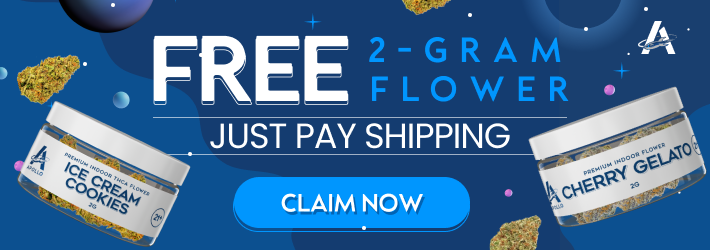Cannabis is taking over Christmas. While the holiday season typically meant indulging – or over-indulging – in a bit of drinking, the wave of legalization across the US is making a big difference in the way we celebrate. As more people start feeling comfortable with smoking weed around their families, the traditional way to celebrate is being challenged for the first time. So are we on the verge of people smoking pot with their grandmas after the turkey? Will you be unwrapping a bong instead of a whisky bottle on Christmas morning? Everything from driving-under-the-influence of cannabis, to using weed to reduce political (and Covid) tension, we’ve surveyed almost 2,000 cannabis users to find out how the holidays are changing for people across the country.
Key Findings
- 47% would enjoy getting high with family during the holidays, with another 27% saying they’d like to sometimes.
- 54% plan to give cannabis-themed gifts, especially cannabis beverages and edibles.
- 48% feel more comfortable discussing difficult topics such as politics with family after smoking weed, and 61% feel more comfortable spending time with anti-vaccine family.
- 54% said they would love it if their employer served cannabis-infused treats at the office party.
- 65% plan to completely or occasionally replace alcohol with cannabis over the holidays, mainly because cannabis is less harmful than alcohol.
- 49% drive high but wouldn’t drive drunk, with 64% saying they feel safer driving high than drunk.
- 45% plan to abstain or cut down on cannabis use during January, with 27% aiming for a completely “dry January.”
- 48% don’t experience weed hangovers and feel productive and refreshed the next day.
- 51% say they’re more likely to stick to New Year’s resolutions if they’re using cannabis.
- 60% feel more physically active and productive after using cannabis, and only 18% say they feel less active and productive.
The Survey
Our survey was conducted through Pollfish, with questions covering various aspects of cannabis use and acceptance around the holidays. In total, 1,925 Americans aged 21 or over responded to the survey, with the only requirement being that they’d tried cannabis at least once in their life. This gives a broad look at how the growing acceptance of cannabis is changing things for families around the country this holiday season.
Alcohol vs. Weed for the Holidays: DUI’s, Work, and Family Fun
There is a growing sense that alcohol has had its time in the spotlight, and we asked several questions to work out exactly what this means and how much of a change to expect this year and in the coming years. Do people really want to get high with their families? Can weed replace booze at the office Christmas party? Here are the answers.
Two-Thirds Will Replace Alcohol with Cannabis to Some Extent
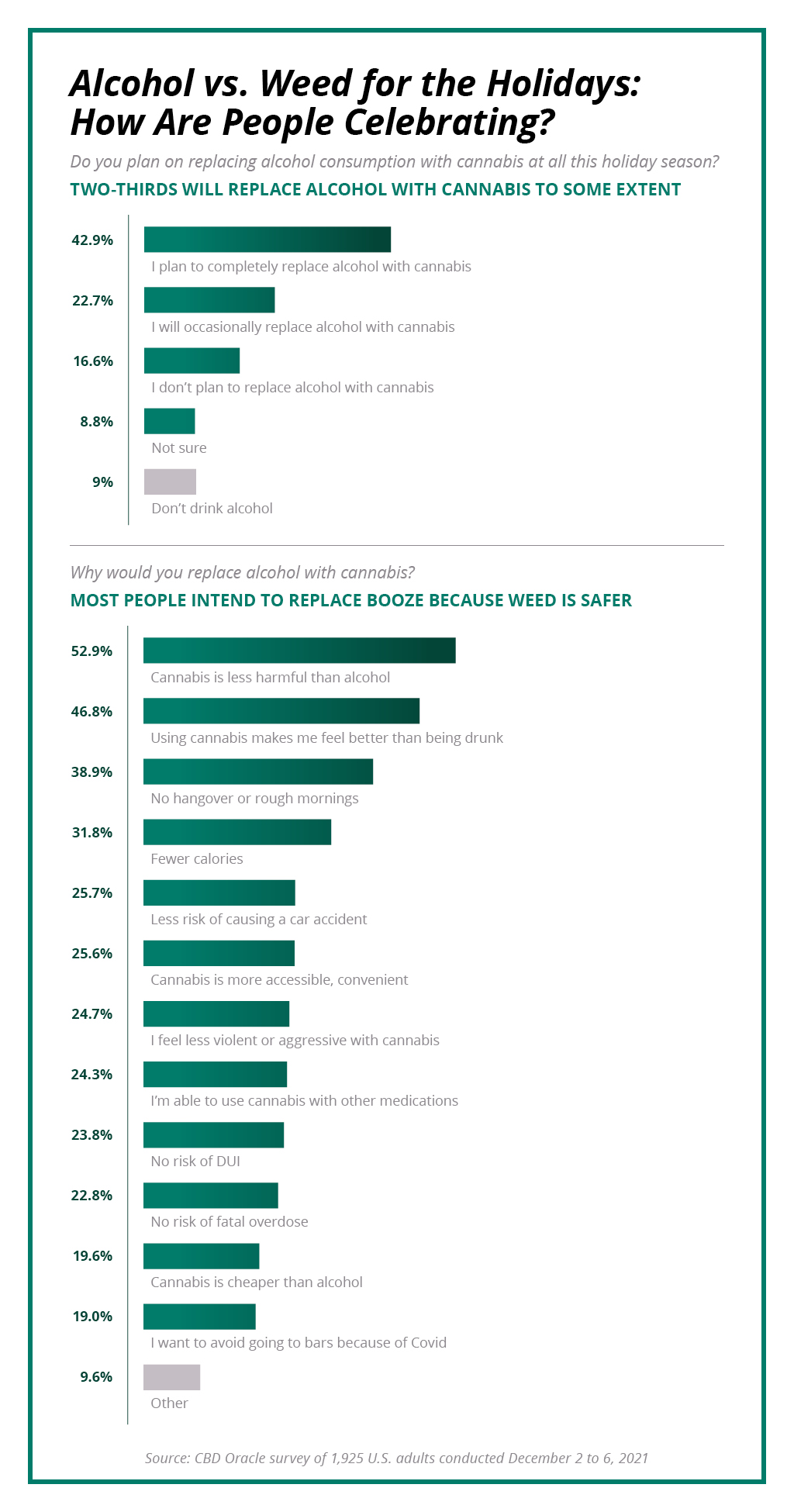
We asked the respondents whether they plan on replacing alcohol with cannabis through this holiday season, and the results show that 65.6% intend to replace it to some degree. Specifically:
- 42.9% said they plan to completely replace alcohol with cannabis
- 22.7% said they will occasionally replace alcohol with cannabis
- 16.6% don’t plan to replace alcohol with cannabis
- 8.8% aren’t sure
- And 9% don’t drink alcohol anyway
In short, the majority of cannabis users intend to replace alcohol with cannabis to some extent this year.
53% Intend to Replace Booze Because Weed is Safer
When asked what their reasons were for intending to replace alcohol with cannabis, 52.9% said it was because cannabis is safer than alcohol, and 46.8% said it was because using cannabis makes them feel better than alcohol does. After this, the lack of a hangover – or dopeover – was cited as an explanation by 38.9% of respondents.
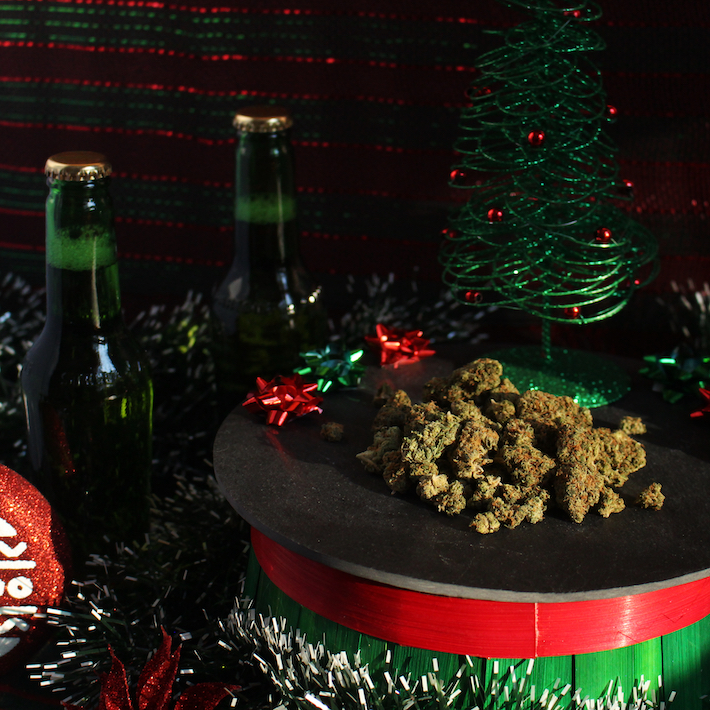
The full breakdown of reasons looks like this (noting that people could choose multiple options):
- Cannabis is less harmful than alcohol: 52.9%
- Using cannabis makes me feel better than being drunk: 46.8%
- No hangover or rough mornings: 38.9%
- Fewer calories: 31.8%
- Less risk of causing a car accident: 25.7%
- Cannabis is more accessible, convenient: 25.6%
- I feel less violent or aggressive with cannabis: 24.7%
- I’m able to use cannabis with other medications: 24.3%
- No risk of DUI: 23.8%
- No risk of fatal overdose: 22.8%
- Cannabis is cheaper than alcohol: 19.6%
- I want to avoid going to bars because of Covid: 19.0%
- Other: 9.6%
The key theme behind most of these responses is that cannabis offers a smoother, less risky experience than alcohol overall. While some of the responses are questionable – no risk of a DUI, for instance – it’s clear that there is an underlying thread linking the majority of them.
48% Would Want to Get High With Family at Holiday Gatherings
Our survey shows that 47.7% of respondents would enjoy getting high with their family at gatherings around the holiday season. Another 27.1% said they would like to do so sometimes, making around three-quarters who would consider lighting up with their family at some point during the holidays. This is really a sign of how far things have come over in relatively few years, with cannabis being increasingly substituted for alcohol both personally and in more social settings. Only 16.3% said they wouldn’t want to, with the remaining respondents not being sure.
In legal states, the number interested in getting high with their family increases to 54.8%, with another 27.8% saying they would want to sometimes. The biggest difference comes from people who have many family members who use cannabis, with 76.9% of them saying they’d enjoy it and 13.2% saying they would want to do so sometimes. In contrast, this decreases sharply for people with no family members who toke, where just 21.9% would enjoy it and 30.7% saying they would want to do it sometimes.
Almost Half of Cannabis Users Drive High
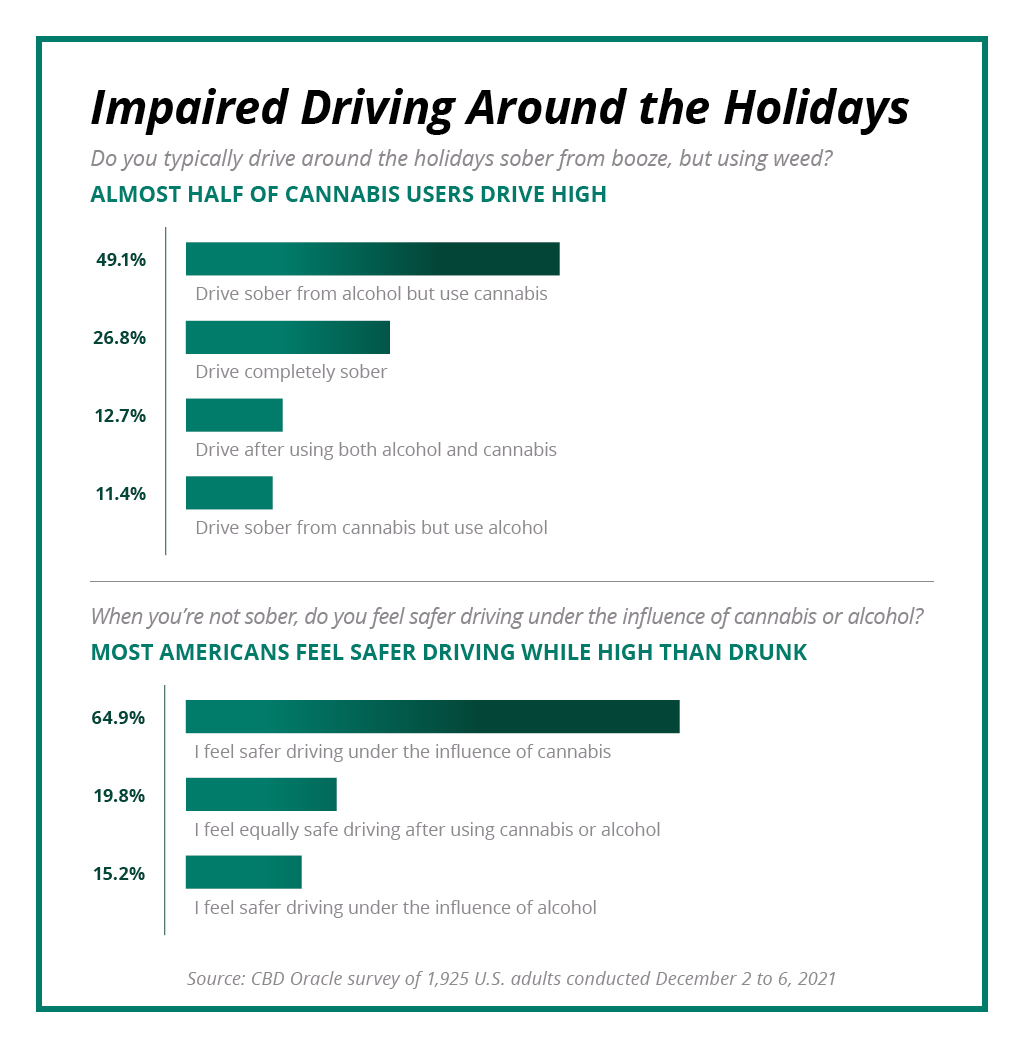
One somewhat concerning point coming from the survey results is that almost half (49.1%) of respondents say they typically drive sober from alcohol but use cannabis. Another 12.7% drive under the influence of both alcohol and cannabis, and 11.4% drive after drinking but not while high. Only 26.8% stay completely sober while driving.
This is concerning because statistics show that car crashes that result in injuries are up by 6% in states with legal cannabis, but it should be stressed that the data points the finger at combining the two, rather than weed alone. The evidence on driving after smoking weed overall suggests that while smokers are more aware of their impairment than drinkers are, driving under the influence of weed still causes substantial issues.
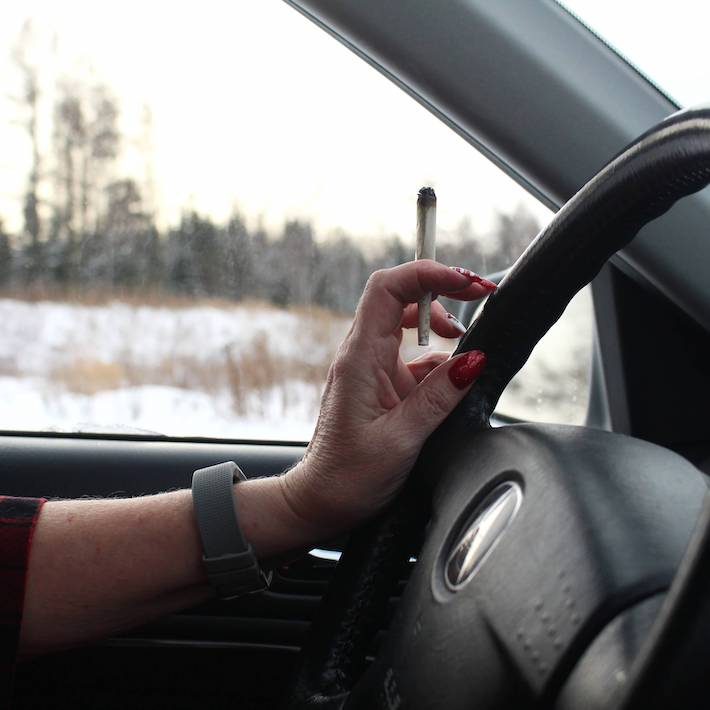
In fact, 64.9% of survey respondents said that they feel safer driving while high than under the influence of alcohol. This might be a case of comparing bad with worse, but it underlines that driving while high is seen a little differently than driving drunk.
55% of Cannabis Users Want Weed-Infused Treats at the Office Christmas Party
Drinking at the office party is well established as a part of Christmas tradition, but our survey reveals that the majority of people who’ve used cannabis want weed to be involved in the office party this year. The results show that 54.9% of respondents said they would really love it if their employer served cannabis-infused treats at their office parties. Another 14.3% said they didn’t care either way, implying that it at least wouldn’t bother 69.2% of the office. Only 20.5% said they didn’t think it should be served at the party.
In legal adult use states, 63.8% said they would really love it, and an additional 11.8% didn’t care either way, making it over three-quarters who would either like it or not have an issue. Of course, this isn’t to say that their employers would agree, but clearly the option is there.
Managing Holiday Stress with Weed: Vaccines, Political Differences – and Christmas Dinner
People in the US generally experience more stress around the holidays. Whether it’s because of the pressure of paying for all the gifts and food, worrying about getting enough time off work, decorating the house or friction at the dinner table, there are plenty of explanations for this. And not everyone feels this stress equally – women and people with lower incomes are hit particularly hard. However, can the increasing acceptance of cannabis help to rectify these issues?
69% Increase Their Cannabis Use Over the Holidays
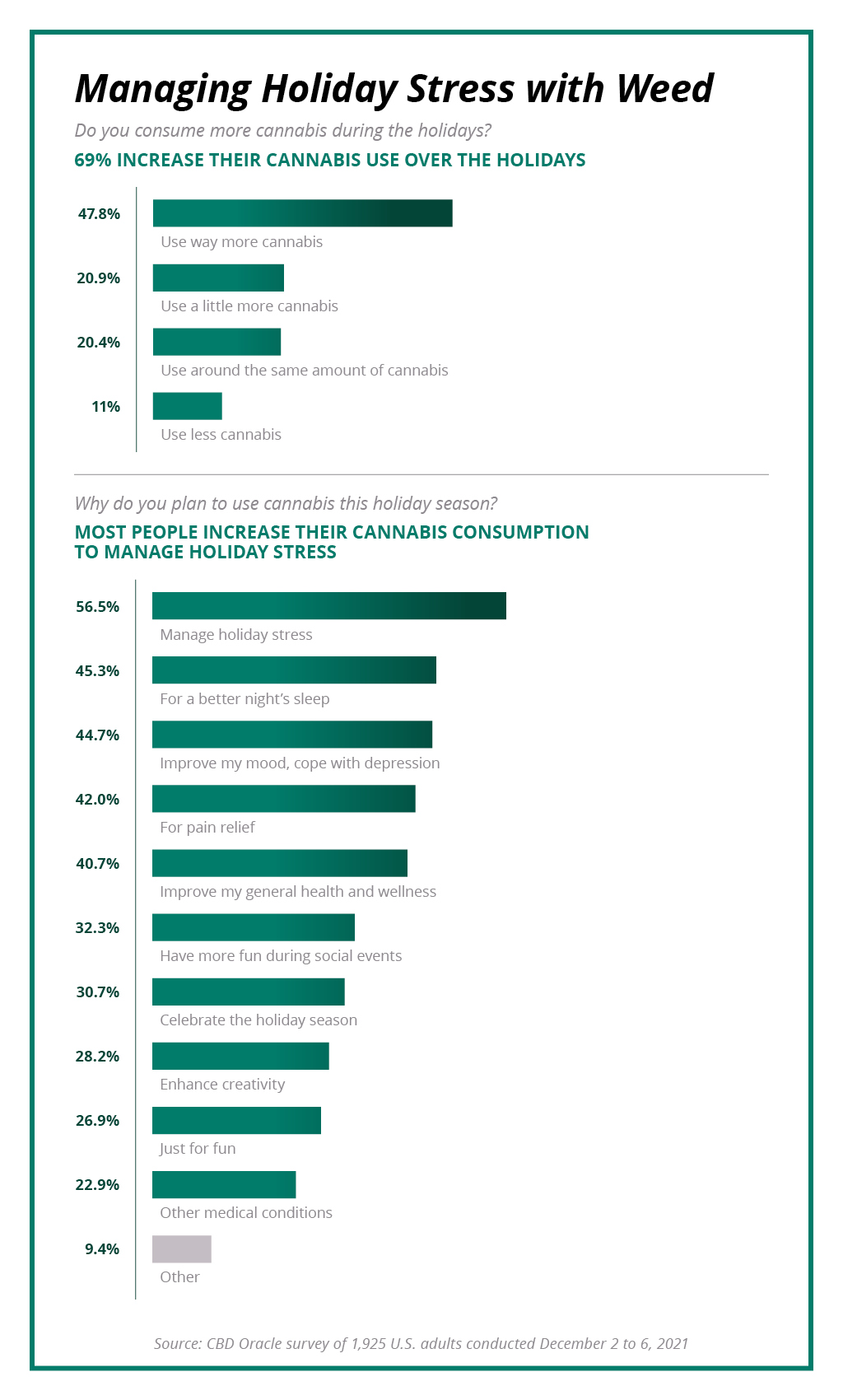
With results showing that people drink twice as much over the holidays, it shouldn’t come as much of a surprise that cannabis use increases over the holidays too. According to our survey, 68.7% of respondents say they use more cannabis over the holidays, with 47.8% saying they use “way more” and the remaining 20.9% saying they use “a little more.” Another 20.4% say they use around the same amount, and just 11% use less.
For alcohol, part of this is down to the substantial increase in socializing over the holiday period, with the average of one social event per week increasing to three in the season. This is likely part of the explanation for people increasing their cannabis use too, as well as the fact that people are more likely to engage in sedentary activities over the holiday period.
Interestingly, the increase in cannabis use over the holidays is more down to men than women, with just 54.4% of women saying their use increases. Among these, just 30.3% say they use “way more.” In fact, the most popular individual response with women was using the same amount, with 30.7% saying that the holidays don’t make a difference to how much they consume. In contrast, 78.6% of men say their use increases over the holidays.
Most People Increase Their Consumption to Manage Holiday Stress
Managing holiday stress is the most widely-cited reason for using cannabis over the holiday period, accounting for 56.5% of all responses. This makes sense, given that relaxation and stress relief are the most common reasons given for using cannabis overall, and the holiday period brings plenty of additional sources of stress.
The breakdown of the remainder of responses is as follows:
- Manage holiday stress: 56.5%
- For a better night’s sleep: 45.3%
- Improve my mood, cope with depression: 44.7%
- For pain relief: 42.0%
- Improve my general health and wellness: 40.7%
- Have more fun during social events: 32.3%
- Celebrate the holiday season: 30.7%
- Enhance creativity: 28.2%
- Just for fun: 26.9%
- Other medical conditions: 22.9%
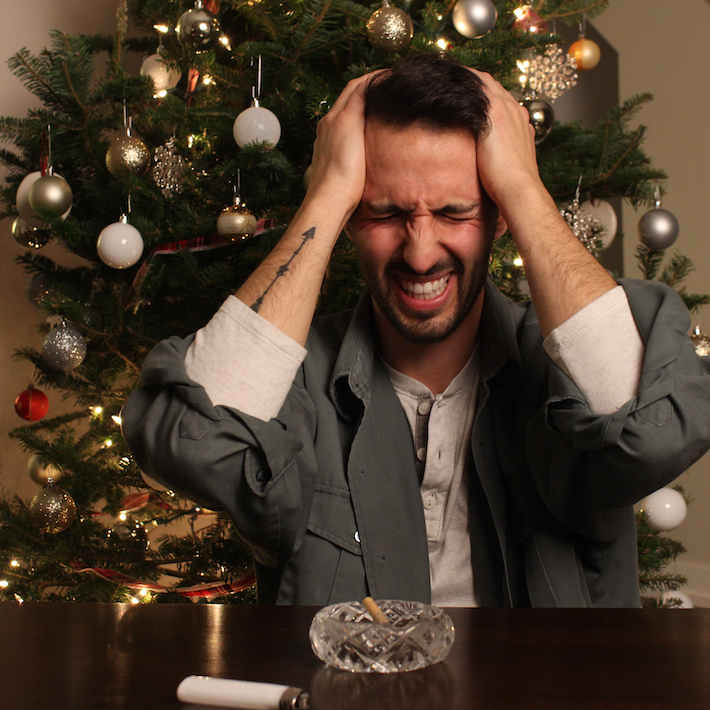
Again, contrary to expectations, women were actually less likely to cite managing holiday stress as the reason for using cannabis over the holidays, with just 47.3% responding in this way compared to 62.9% of men.
28% Plan to Wake and Bake on Christmas Day
Smoking weed at Christmas isn’t the sort of thing you’d see in a Hallmark special, but our survey suggests 28.4% of people who’ve tried weed intend to do it just after waking this year. We asked what part of the day (if any) is ideal for indulging on Christmas day, and to “wake and bake” (i.e. get high the first thing in the morning) was the most popular answer. The next most-popular response was smoking after dinner (22.7%), followed by before dinner (16.7%) and later in the evening (15.7%). While options like cannabis-infused gravy are available (especially in legal states), only 7.7% would opt for something like this.
There wasn’t much variation between legal adult use states and those where only medical or no use is legalized, although more people in non-adult use states would wake and bake, with 33.3% opting for this vs. 27.7% in legal states.
61% of People Feel More Comfortable Being with Anti-Vaccine Family Members After Smoking
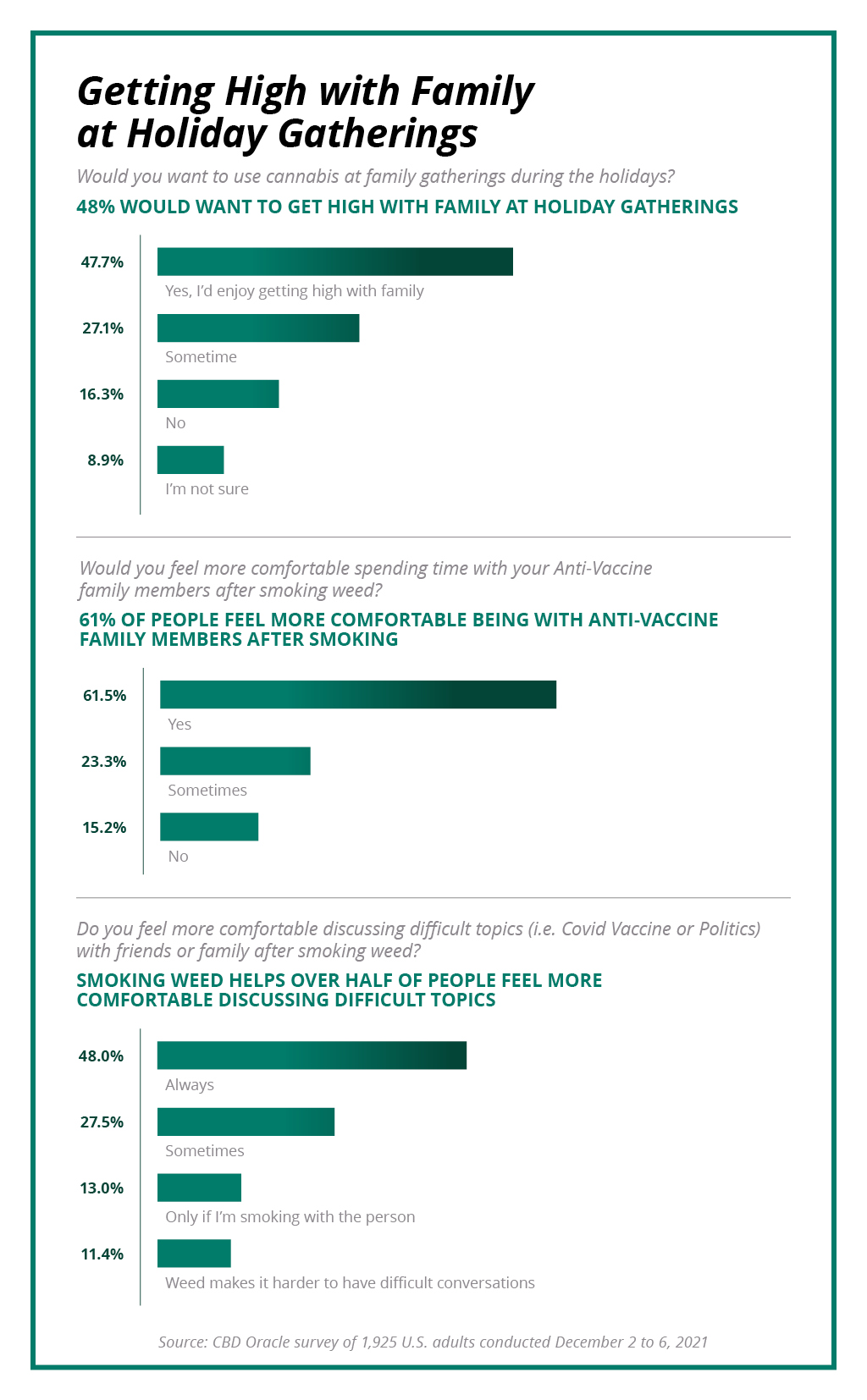
Vaccine politics has become a much more serious topic in 2021, with the rollout of the various COVID vaccines emphasizing a sharp divide that permeates the entire country. With the pandemic still dragging on – thanks to omicron – and still some work to go on getting total vaccine coverage, there may be some tense moments at Christmas tables around the country. You can’t easily turn away your anti-vaccine aunt or QAnon uncle, so there’s a good chance many people will have to spend a lot of time with the ones they believe are partially responsible for keeping us in this situation.
However, 61.5% of respondents say they’d feel more comfortable doing this after smoking a little weed, and another 23.3% say it would sometimes make them feel more comfortable. Only 15.2% said that it would make them feel less comfortable. Although there may be a slightly dystopic element to this – after all it’s far from the ideal situation – it seems like weed helps to maintain some family unity at the table when there is potential tension.
Smoking Weed Helps Over Half of People Feel More Comfortable Discussing Difficult Topics
Most people know that discussing something like politics at the dinner table is a recipe for disaster, but that doesn’t stop it from happening across the country each year. As well as helping people feel more comfortable being at a table with unvaccinated family members, 48% responded that cannabis always helps them feel more comfortable discussing difficult topics like politics or the vaccine. Additionally, 13% said it would help if they shared the weed with the person they’re talking with, and 27.5% said it would help sometimes. Only 11.4% said it would make it more difficult.
54% Will Give Cannabis-Themed Gifts This Year
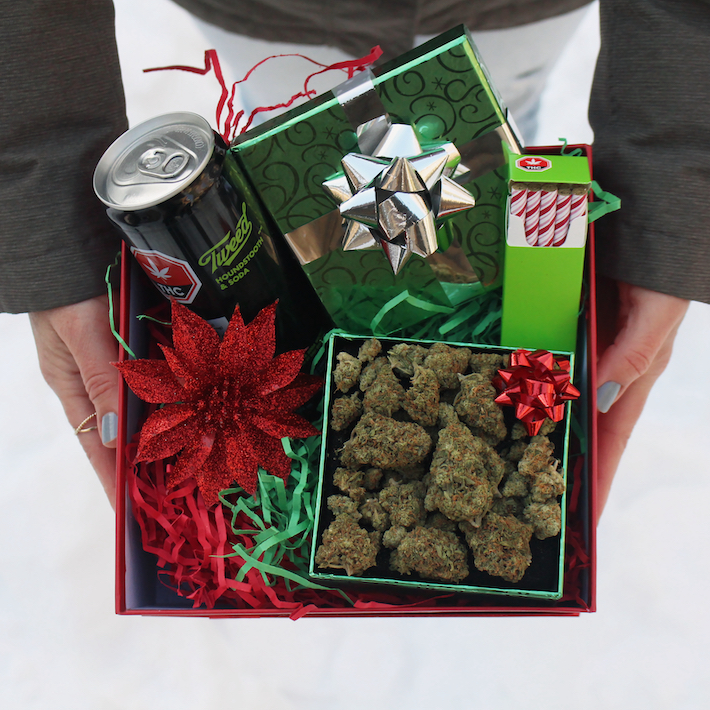
Giving alcohol as a gift is pretty common, but what about weed? According to our survey, 53.8% of people who’ve tried weed intend to give a cannabis-themed gift this year. Another 24.1% said they might do so, with just 22.1% saying that they wouldn’t. This changes a lot for people who said they have many family members who use cannabis, of whom 77.9% said they’ll give cannabis-themed gifts this year. The most common intended recipients of these gifts were friends (58.3%), with family members in second place (45.5%).
The most popular specific type of gift chosen was cannabis-infused beverages, such as weed eggnog, beer, tonic or aperitifs, with 52.1% of respondents choosing this option. The full set of responses looks like this:
- Cannabis-Infused Beverages: 52.1%
- Edibles: 39.8%
- CBD Products: 37.6%
- Pre-Rolls: 35.7%
- Flower: 35.3%
- Accessories: 29.9%
- Vaporizers: 26.3%
- Skincare, Beauty Products: 25.5%
- Concentrates: 23.3%
- Tinctures: 19.9%
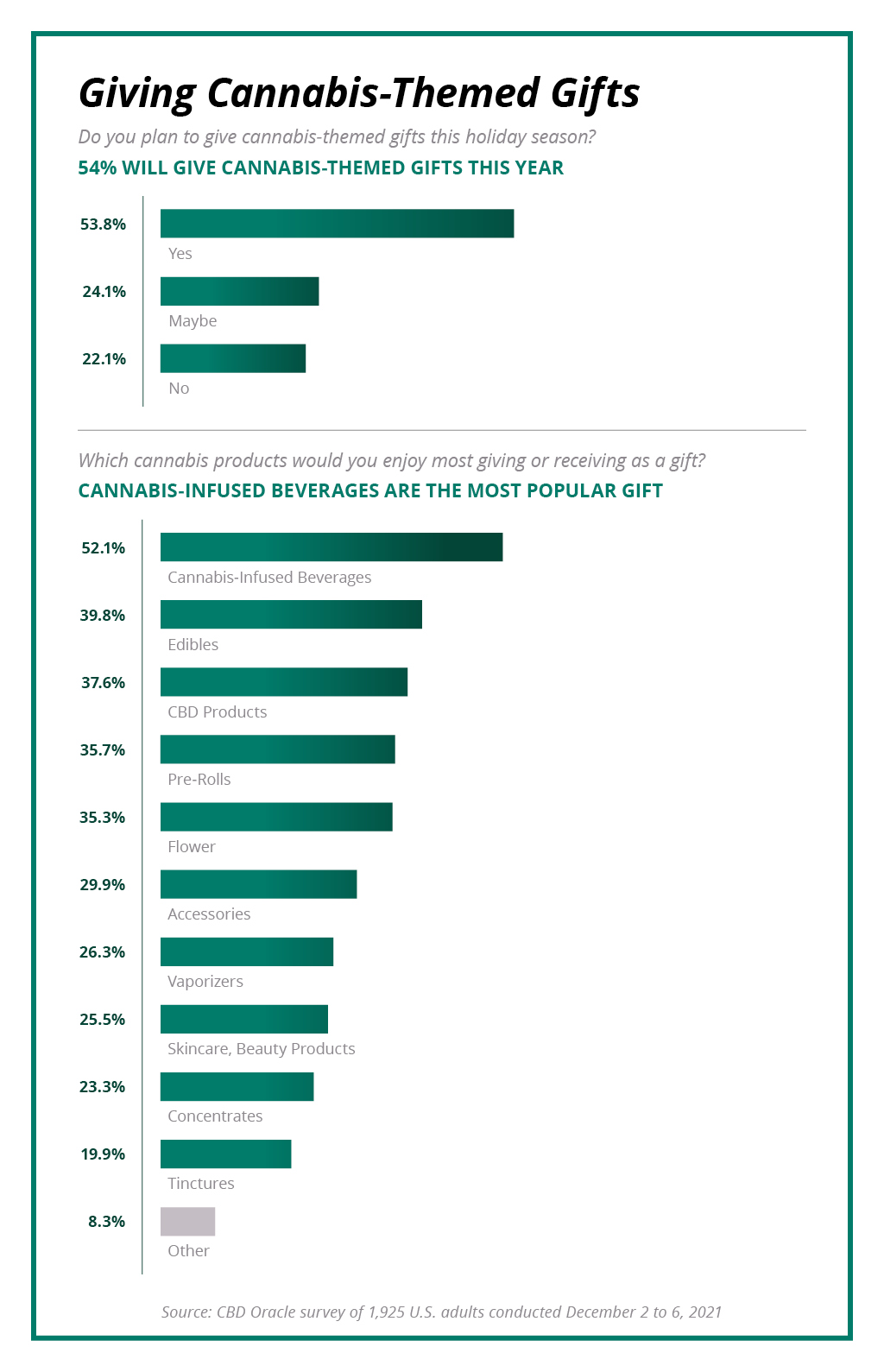
While accessories and flower might be the first thing you think of when it comes to weed gifts, it appears that the majority of users go right to things like beverages and edibles. CBD products could of course fall into these categories too.
The Consequences of Holiday Cannabis Use: Dry January, Resolutions and Weed Hangovers
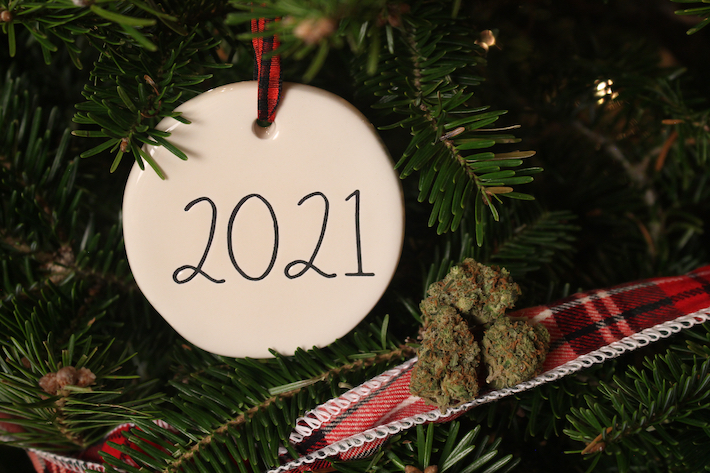
“Dry January” sums up the typical post-holiday guilt over the inevitable over-indulgence of the period. It’s like a little purity ritual that comes after a period of embracing fun and pleasure: you remind yourself that, yes, that was fun, but no, I really shouldn’t keep going like this. For alcohol, this is likely accompanied by memories of harsh hangovers and possibly regrettable actions while intoxicated, but how does that work with weed? Are cannabis users planning on joining Dry January? Are weed hangovers a thing? And how does it affect other resolutions?
45% of Cannabis Users Intend to Stop or Cut Down in January
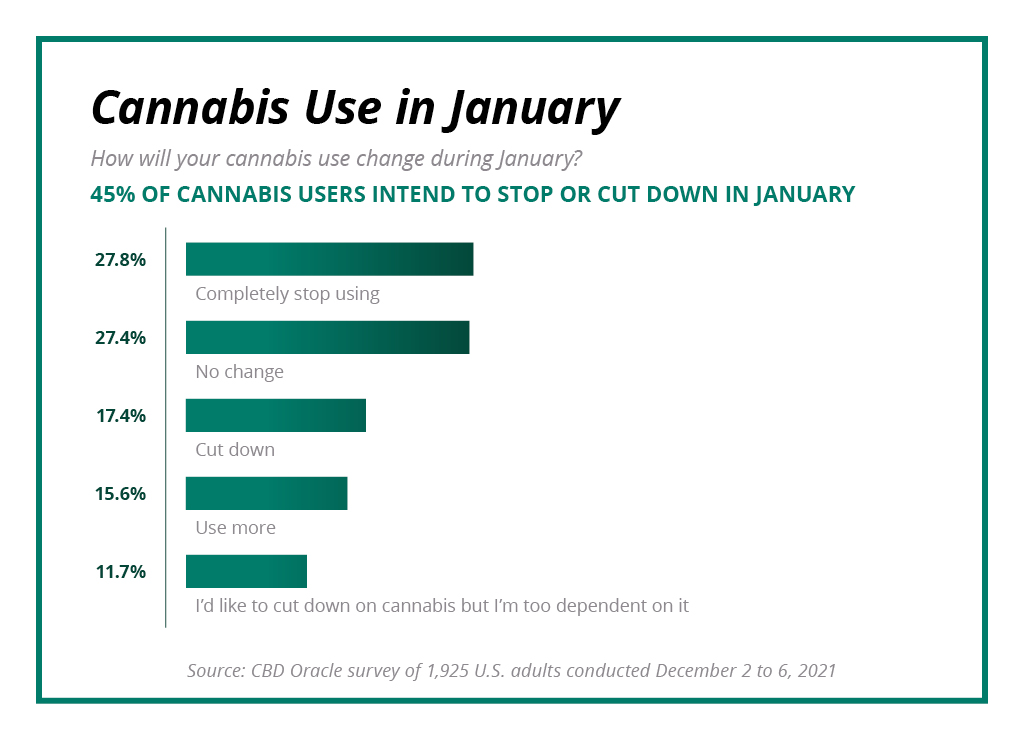
Dry January typically refers to alcohol, but our survey shows that 45.3% of cannabis users will be stopping entirely or cutting down their use for the month of January too. For a “true” Dry January, 27.8% will be completely abstaining for the month, while another 17.5% intend to cut down but not stop entirely. However, 27.4% said that their use won’t change at all in January, and 15.6% said they’ll be using even more. Perhaps the most interesting finding is that 11.7% would like to cut down on cannabis during the month but feel that they’re too dependent on cannabis to do so. This is about in line with the proportion of weed users – and indeed, users of most drugs (including alcohol) – who experience issues with dependence.
Overall, though, these results show that the replacement of alcohol with weed over the holidays will be accompanied by a corresponding backtrack in the New Year. In fact, the percentage is a little higher than the 23% of US adults who drink that participated in 2021. In short, the replacement cuts both ways.
Almost Half of Cannabis Users Don’t Get a “Weed Hangover,” Instead Feel Refreshed
Our survey suggests that cannabis doesn’t have a hangover effect for about half of users and only a mild one for another third. Specifically, 48% said they don’t get a weed hangover, and instead feel productive and refreshed the day after using cannabis. On top of this, 31.2% said that they only experience a “mild” weed hangover, which doesn’t affect their mood or productivity. The remaining 20.8% say they experience a strong weed hangover that impacts their productivity and energy levels the following day.
This is really one of the major benefits of cannabis over alcohol, and 38.9% of respondents said that the lack of a hangover was one of the reasons they’d replace alcohol with cannabis more generally. It’s true that some people experience a “dopeover,” but according to our results it’s much more common to have little or no issues the following day.
Over Half Say That Weed Makes it Easier to Stick to Their New Year’s Resolutions
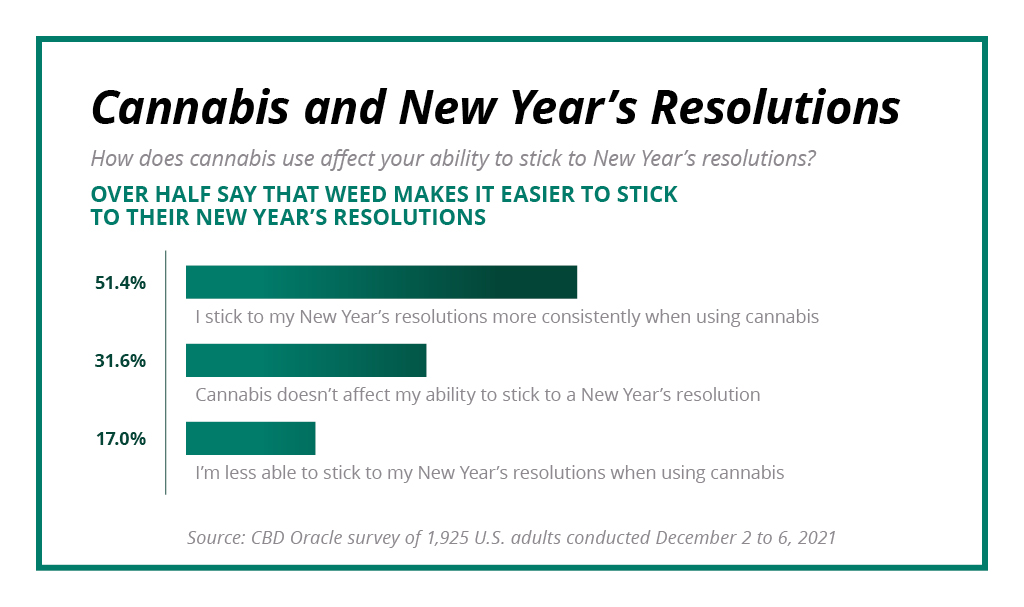
New Year’s Resolutions are a much older tradition but one in the same vein as Dry January – we indulge over the holidays and vow to get better in the New Year. But you might assume that smoking weed would encourage people to lapse into old habits and ditch any plans at self-improvement in the New Year. However, the respondents to our survey largely feel that they stick to their resolutions more consistently when they’re using cannabis, with 51.4% saying so. Another 31.6% say cannabis doesn’t affect their ability to stick to their resolutions. The remaining 17% say that they’re less able to stick to their resolutions when they’re using cannabis.
60% Feel More Physically Active and Productive After Using Cannabis
Flying in the face of the “lazy stoner” stereotype, 60.3% of the respondents to our survey said that cannabis makes them feel more physically active and productive. In fact, just 18.2% said that they feel less active and productive after smoking. The remaining 21.5% said that pot “sometimes” makes them feel more active – likely dependent on the strain they’re using.
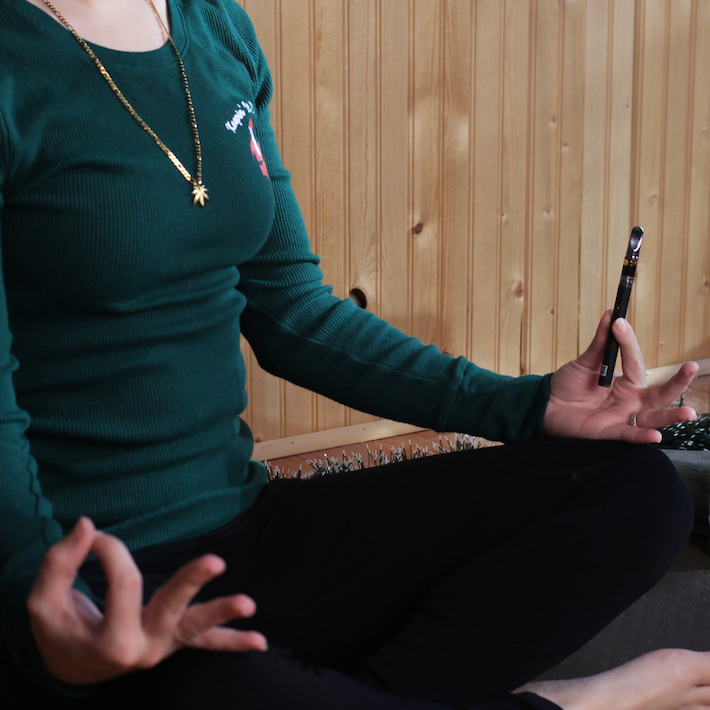
This might seem a little surprising, but digging in a little deeper reveals that this appears to be down to tolerance. The respondents who use cannabis either daily or weekly are more likely to report feeling physically active and productive (71.2% of them), whereas the most common response for people who consume sometimes or rarely was feeling more lazy and unproductive. Around 36.7% of the less frequent users said this, with slightly less (33.8%) saying they felt more active and productive.
In short, this shows that people who use cannabis more often are less impacted by it than people who use less often.
Conclusion – Weed is Here to Stay for the Holidays
The results of the survey show that the landscape of the “traditional” holiday period is changing. While there will still be the family members who prefer to spend the evenings working through a bottle of wine, a growing number will be taking a little break to light up – possibly even with the new strain or bong they got under the tree. Some problems from booze will be carried over – impaired driving, for instance, looks set to remain a serious issue – but overall it looks as though the sometimes-volatile nature of over-indulging in alcohol over the holidays will be replaced with a more chilled, giggly experience with the people you love the most.
It won’t be perfect, but we will certainly be happy to see the change.
Who Are the Respondents? A Look At Our Survey’s Demographics
The only requirements for participating in our survey were that the individuals were US based adults (aged 21+) who have used cannabis at least once in the past. However, as with most surveys, there were a few points about demographics and habits that can help to put the findings into context a little. The most important thing has already been mentioned: these are cannabis users in some sense, not the general population.
Among those users, our sample was skewed towards regular users: 43.1% used cannabis daily, 27.7% used cannabis every week, 16.7% used it “sometimes”, and 12.5% did so “rarely”. We also had slightly more men than women among the 1,925 participants, with 1,136 men (59%) and 789 women (41%). The age range breakdown looks like this: 25 to 34 (34.4%), 35 to 44 (47.0%), 45 to 54 (10.3%), and over 54 (8.3%). Which shows a peak at around middle age and a general skew towards younger age groups above older ones. Other than this, the sample was overwhelmingly (72.4%) white, university or post-graduate educated (67.7%), married (65.1%) and at least reasonably high income (with 47.4% making more than $100k per year).
